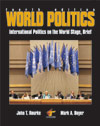Elements for success are those of George, Hall, and Simons (1971), which include (1) strong U.S. determination, (2) a less determined opponent, (3) clear U.S. goals, (4) a sense of urgency to accomplish these goals, (5) adequate domestic political support, (6) usable military options, (7) fear of U.S. escalation by the opponent, and (8) clarity concerning terms of the peaceful settlement. Other elements of success have been provided by Blechman and Kaplan (1978) and include (1) the opponent finds the threat credible, (2) the opponent is not yet fully committed to a course of action, (3) the goal is maintaining the authority of a particular regime abroad, (4) force is used to offset force by an opponent, (5) the goal is to have an opponent continue current behavior, that is, to deter a change in behavior, (6) the action is consistent with prior policy, (7) there has been previous U.S. action in the area, (8) U.S. involvement begins early in the crisis, (9) military action is taken rather than threatened, and (10) strategic forces become involved, thus signaling seriousness of purpose. Caspar Weinberger's six criteria included (1) vital U.S. interests must be at stake, (2) there must be a clear intention of winning, (3) political and military objectives must be clearly defined, (4) sufficient military force must be employed to gain the objective, (5) there must be reasonable congressional and public support, and (6) combat should be a last resort. General Colin Powell's comments, made during a press interview, were not as easily enumerated as Weinberger's, but they generally agreed with the criteria of the then-secretary of defense. Powell's views can be found in the New York Times, September 29, 1992, p. A1. |



 2002 McGraw-Hill Higher Education
2002 McGraw-Hill Higher Education